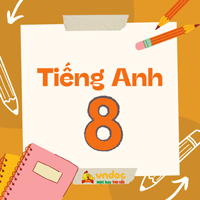Trắc nghiệm tiếng Anh 8 Unit 4 Our past có đáp án
Bài tập tiếng Anh Unit 4 lớp 8 Our past có đáp án
Bài tập tiếng Anh nâng cao 8 Unit 4 Our past có đáp án cung cấp thêm cho các em các bài tập để rèn luyện nâng cao kỹ năng cũng như giúp các em sắp thi học sinh giỏi các bài tập tham khảo để luyện tập. Bài tập được chia thành các mục với các kỹ năng khác nhau giúp các em có thể dễ dàng lựa chọn kỹ năng mình cần tập trung luyện tập. Tất cả các bài tập đều có đáp án.
I. Choose the word that has the underlined part pronounced differently from the others.
|
1. a. match |
b. pan |
c. transmit |
d. safety |
|
2. a. equipment |
b. upset |
c. end |
d. help |
|
3. a. folk |
b. hold |
c. photo |
d. neighbor |
|
4. a. fairy |
b. train |
c. afraid |
d. wait |
|
5. a. excited |
b. prince |
c. once |
d. escape |
II. Choose the word or phrase that best completes each unfinished sentence below or substitutes for the underlined word or phrase.
6. Yesterday I _____ to the cinema.
a. go
b. will go
c. went
d. has go
7. Mozart was born in Salzburg ______ 1756.
a. in
b. on
c. at
d. since
8. _____ Saturday night, I went to bed at 11 o'clock.
a. At
b. On
c. In
d. From
9. I used _____ fishing.
a. enjoy
b. to enjoy
c. enjoying
d. to enjoying
10. It's hard work looking______ three children all day.
a. after
b. before
c. about
d. at
11. I can't stand people who are cruel______ animals.
a. with
b. to
c. on
d. about
12. He died_____ a heart attack.
a. with
b. of
c. because
d. by
13. The sun suddenly _____ from behind a cloud.
a. appear
b. appeared
c. disappear
d. disappeared
14. An oil_____ burned in the darkness.
a. lamb
b. lamp
c. lam
d. lame
15. He was late, but fortunately his friends waited for him.
a. luckily
b. magically
c. cruelly
d. lately
III. Choose the words or phrases that are not correct in Standard English.
16. Bob lived in (A) Rome for (B) three years; now he was living (C) in (D) Amsterdam.
17. There used to (A) be a movie theater here but (B) it close (C) a (D) long time ago.
18. I don't want to (A) sound likely (B) I'm complaining, but (C) this plan is unfair (D).
19. We took all (A) the rubbish outside (B) and burn (C) it (D).
20. He made (A) me feel (B) like such a foolish when he used me as an example!
IV. Choose the word (a, b, c, or d) that best fits each of the blank spaces.
One day, two men (21) _____ in the woods. Suddenly, they saw a huge black bear. One man immediately (22) _____ down, took off his backpack, and took out his sneakers. He began (23) ______ off his hiking boots. The other man looked (24) _____ him and said, "Are you crazy? Do you think you can run (25) ______ than that bear?" "No," replied the first man. "But I can run faster than (26)_____!"
take off (phrv): cởi( giày. . . ) sneakers (n): giày chạy bộ
hiking boots (n): giày đi bộ
|
21. a. hiked |
b. are hiking |
c. was hiking |
d. were hiking |
|
22. a. sits |
b. sited |
c. sitted |
d. sat |
|
23. a. take |
b. taking |
c. to take |
d. b & c |
|
24. a. on |
b. at |
c. for |
d. after |
|
25. a. fast |
b. fastly |
c. faster |
d. more fast |
|
26. a. him |
b. his |
c. you |
d. your |
V. Read the following passage and choose the item (a, b, c, or d) that best answers each of the questions about it.
In Scotland, there is a popular legend about a monster. The monster lives in a lake called Loch Ness, near the town of Inverness. Loch Ness is 32 km long, 5 km wide, and very, very deep. The monster's name is Nessie. People say that she is very big, and that she has got a long neck, like a snake.
The legend of the monster is very famous, and millions of tourists from all over the world come to Loch Ness. Everybody wants to be the first person to see Nessie. Come to Scotland and Loch Ness _ that person may be you!
legend (n) : truyền thuyết monster (n) : quái vật
27. What does the word 'popular' in the first line mean?
a. ancient b. modern c. famous d. interesting
28. What is the length of Loch Ness?
a. 32 km b. 5 km c. very deep d. no information
29. Which of the following does the word 'she' in line 4 refer to?
a. legend b. Loch Ness c. the monster d. the town
30. The tourists want to _____ .
a. hear about the monster b. swim in the lake
c. be the first person to see the monster d. catch the monster
31. Which of the following is not true?
a. The name of the monster is Nessie.
b. The lake where the monster lives is near the town of Inverness.
c. Millions of tourists saw Nessie.
d. The lake where the monster lives is in Scotland.
VI. Read the following passage, and then answer the questions below.
Good memory is great help in learning language. Everyone learns his own language by remembering what he hears when he is still small child and some children like boys and girls who live abroad with their parents seem to learn two languages almost as easily as one. In school, it is not so easy to learn second language because pupils have so little time for it, and they are busy with other subjects as well.
The best way for most of us to remember things is to join them in our mind with something which we know already, or which we easily remember because we have picture of it in our mind. That is why it is better to learn words in sentences, not by themselves, or to see, or do, or feel what the word means when we first use it.
32. How does everyone learn his own language?
_______________________________________
33. Why isn't it easy for pupils to learn second language at school?
_______________________________________
34. What is the best way for us to remember things?
_______________________________________
35. Is it better to learn words by themselves?
_______________________________________
36. How should we learn new words?
_______________________________________
ĐÁP ÁN
I. Choose the word that has the underlined part pronounced differently from the others.
1 - d; 2 - a; 3 - d; 4 - a; 5 - d;
II. Choose the word or phrase that best completes each unfinished sentence below or substitutes for the underlined word or phrase.
6 - c; 7 - a; 8 - b; 9 - b; 10 - a;
11 - b; 12 - b; 13 - b; 14 - b; 15 - a;
III. Choose the words or phrases that are not correct in Standard English.
16 - c; 17 - c; 18 - b; 19 - c; 20 - c;
IV. Choose the word (a, b, c, or d) that best fits each of the blank spaces.
21 - d; 22 - d; 23 - d; 24 - b; 25 - c; 26 - c;
V. Read the following passage and choose the item (a, b, c, or d) that best answers each of the questions about it.
27 - c; 28 - a 29 - c; 30 - c; 31 - c;
VI. Read the following passage, and then answer the questions below.
32 - Everyone learns his own language by remembering what he hears when he is still small child.
33 - Because pupils have so little time for it, and they are busy with other subjects as well.
34 - It is to join them in our mind with something which we know already, or which we easily remember because we have picture of it in our mind.
35 - No, it isn't.
36 - We learn new words in sentences.
Trên đây là Bài tập tiếng Anh 8 Unit 4 Our past có đáp án. Mời bạn đọc tham khảo thêm nhiều tài liệu ôn tập Tiếng Anh lớp 8 cả năm khác như: Để học tốt Tiếng Anh lớp 8, Đề thi học kì 1 lớp 8, Đề thi học kì 2 lớp 8, Bài tập Tiếng Anh lớp 8 theo từng Unit trực tuyến,... được cập nhật liên tục trên VnDoc.com.
* Xem thêm hướng dẫn học Unit 4 SGK tiếng Anh 8 tại:
Soạn Unit 4 lớp 8 Our past
Bên cạnh việc tương tác với VnDoc qua fanpage VnDoc.com, mời bạn đọc tham gia nhóm học tập tiếng Anh lớp 8 cũng như tiếng Anh lớp 6 - 7 - 9 tại group trên facebook: Tiếng Anh THCS.









